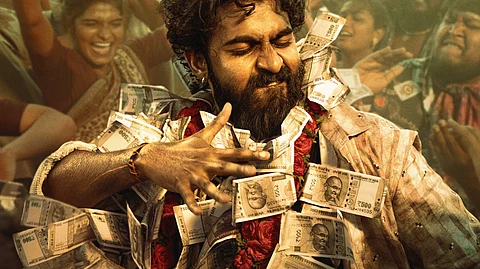

Ekka (Kannada)
At its heart, Rohit Padaki’s Ekka is the story of disillusionment. Yuva Rajkumar plays Mutthu, a young man from the village of Parvathipura, who cherishes the idyllic, even-keeled life he’s known since birth. A quick game of cards, which he always wins (hence the moniker Ekka, meaning the ace card), the customary catch-up with his childhood friends, or playful banter with his mother — every bit of Mutthu’s mundane routine hints at a steady life that he believes a big city like Bengaluru can never offer.
Yet, as his mother (played by Shruti) insists, it’s the city where success lies. “The village is meant to retire in, but the city is where you live,” she says. An unsolicited opportunity presents itself to Mutthu when a close friend dupes him and hides in the labyrinth that is Bengaluru, and Mutthu has no choice but to leave his cocoon and step into the mirage city. But what appears to be a short trip at first soon spirals downward, and each step becomes an unforgiving test of his idealism and innocence.
There’s no doubt that Ekka borrows its ethos from films like Ram Gopal Varma’s Satya (1998), Upendra’s Om (1995) and to an extent, Francis Ford Coppola’s The Godfather (1972). The film also employs the gangster milieu to drive its protagonist’s lamb-to-lion journey, and conjures a flimsy underbelly that vaguely resembles the Bengaluru of the 1980s and ’90s to aid this arc.
There’s a league of dreaded gangsters who control various urban rackets: one “handles” the real estate, another is the oil mafia kingpin, the third the garbage cartel, and so on. There is also a super cop (played with some fun by ‘Deadly’ Adithya) who wants to take them down in his eccentric ways, along with politicians, hit men, crooks with a conscience, and the whole gamut.
How does Mutthu, a wide-eyed kid who was driving cabs and looking for his swindler friend until the night before, suddenly find himself in the thick of all this? Ekka is all about that very moral transformation. But despite its strong intent and ambition to tell the epic tale, the film falters by painting in broad strokes and leaving behind a murky picture that’s just enough to notice, but not enough to remember.
Interestingly, it is the prelude to the fall-from-grace arc that one would have liked a lot more of. Though Padaki leans on familiar templates, he still impresses with how he imbues the setup of the story with a sense of naturalism. Be it the way in which Mutthu’s affable naivete wins him friends and relationships in the new city, how Bengaluru’s working class life is explored without any frills, or how Yuva Rajkumar is never positioned as the ‘hero’ of the project but as just another man in the crowd — these and many other touches are refreshing in a film billed to be a top-rank commercial entertainer.
The writing carries a matter-of-fact tone that never lingers too long even in crucial moments, and it is here that Padaki also manages to subtly raise the emotional stakes of his film. The romance track featuring Yuva and Sanjana Anand (as the sprightly Nandini) is crisp, just as the other relational threads feel organic and integral to the story. Although indeterminately, Ekka showcases how a megalopolis can begin to feel like home if there’s enough love and warmth to rely on.
Satya Hegde’s cinematography remains non-intrusive while Charan Raj’s music, as expected, breathes more life into the narrative. Yuva Rajkumar’s measured performance comes as a bright spot, and the film marks a pleasant improvement in his craft since his debut, Yuva (2024).
The film starts to come undone when it is faced with the challenge of navigating its own emotional weight. As the story reaches its interval high and poises itself to veer towards a darker territory, a sharp dip in focus sets in. The gangster portion takes over, and in an attempt to intensify the drama underneath, the screen is overwhelmed with routine gangster catalogue involving shootouts, shady deals, and what not.
Atul Kulkarni’s role as Masthan, a crime lord with a heart, comes forth as an interesting dynamic with Mutthu, but the writing grows unsure of how to provide impetus to it. The same goes for Poornachandra Mysore’s ‘Daddy’, who is made to be over-the-top but without a definite purpose, whereas Sampada’s role as Mallika never really finds any footing.
The bigger problems occur when the story obliterates itself with bullets and bravado, losing sight of the very intimacy that defined its, and Mutthu’s, essence all along. Mutthu’s character is hardly tested in terms of guilt and responsibilities; Ekka ends up being a bit of a missed opportunity as a result.
Still, the film has a few memorable moments to its name, and almost all of them occur in the first half. In fact, Ekka is a tale of two halves, one starkly more compelling than the other. The narrative flaws sabotage what could have been a mightier journey, and for this, the writing could have imagined a setting that didn’t ride so much on cliches and familiarity.
Swaroop Kodur is a freelance film writer, critic, and fledgling filmmaker.
Disclaimer: This review was not paid for or commissioned by anyone associated with the film. Neither TNM nor any of its reviewers have any sort of business relationship with the film’s producers or any other members of its cast and crew.